When you apply for DSCR loans, understanding the process and requirements can make a significant difference in the success of your application. Whether you’re a real estate investor, entrepreneur, or self-employed professional, debt service coverage ratio (DSCR) loans provide a flexible financing option for investment properties. With the income of the property being the primary determiner of loan terms, you don’t have to provide personal income verification to prove you can support the loan, giving it an edge over traditional mortgages.
At Defy Mortgage, we specialize in providing innovative lending solutions, including DSCR loans and other investment property loans such as bank statement loans and other non-traditional lending options. Our expertise, coupled with a streamlined process, ensures you get the financing you need without hassle. With flexible terms and personalized support, we help you achieve your investment goals confidently and efficiently.
Drawing from our years of experience in non-traditional lending solutions, we’ve written this guide to break down everything you need to know to navigate the application process effectively.
Here are 10 actionable tips to streamline the DSCR loan process and improve your chances of approval.
Top 10 Tips for a Successful DSCR Loan Application
To get the best results when you apply for DSCR loans, it’s important to keep all of the eligibility requirements in mind. But more than that, it’s also crucial that you proactively address potential challenges and align your strategy with lender expectations.
1. Understand Your DSCR Requirements
Ensuring that you meet, if not exceed, all of the eligibility requirements for DSCR loans is the primary way you can secure approval with ideal terms.
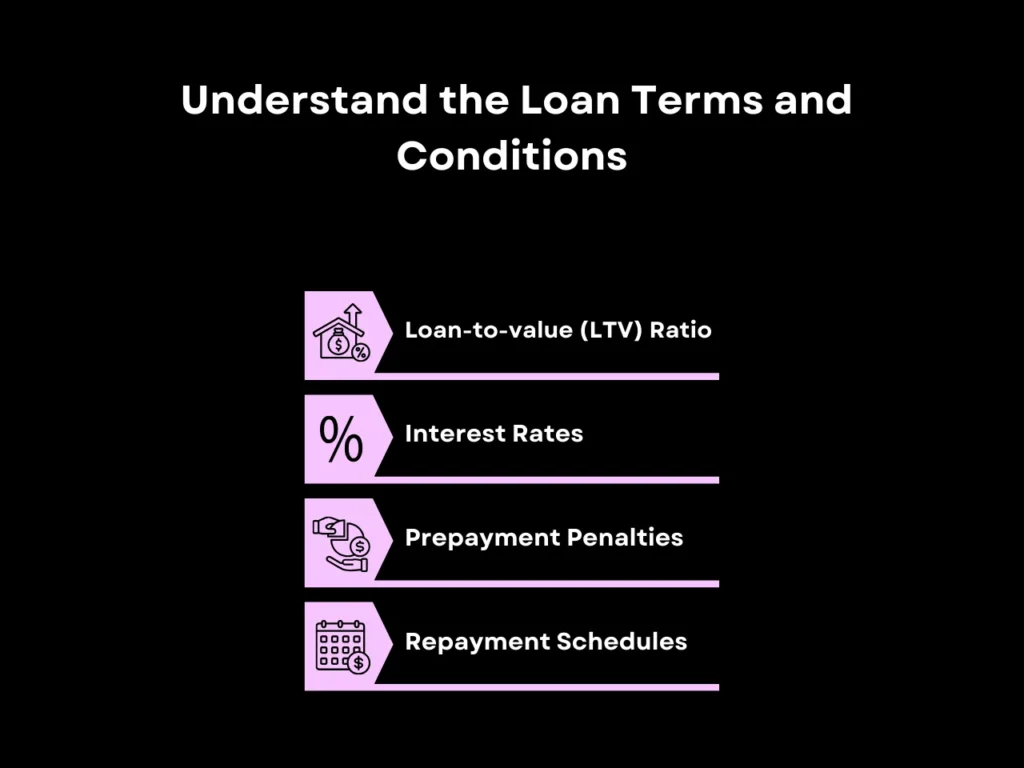
- Minimum DSCR Ratio: The debt service coverage ratio is the most critical factor in determining eligibility for a DSCR loan. Most lenders require a DSCR ratio of at least 1.2 to approve a DSCR loan, meaning the property should generate 20% more income than its annual debt obligations. At Defy, however, we offer DSCR loans for properties with DSCRs as low as 0.75.
- Eligible Property Types: DSCR loans typically apply to investment properties like single-family rentals, multifamily units, vacation homes, short term rentals, commercial real estate, and mixed-use properties. Primary residences, manufactured homes, multifamily homes with more than 4 units, and single-room rentals are usually not eligible.
- Loan-to-Value (LTV) Ratio: Lenders often set maximum LTV ratios, commonly around 75%–80%, meaning you’ll need to provide a 20%–25% down payment or have at least 20%-25% equity if refinancing.
- Property Income Documentation: Demonstrating the property’s ability to generate consistent income is essential. This involves providing recent rent rolls, lease agreements, or other proof of income.
- Credit Score: While DSCR loans are less dependent on personal financials, many lenders look for a credit score of 650 or higher to ensure financial responsibility.
- Cash Reserves: Some lenders require borrowers to have cash reserves equivalent to several months of debt payments to mitigate risk.
By fully understanding and meeting these requirements, you position yourself as a prepared and reliable borrower. This not only increases your chances of approval but also opens the door to more competitive loan terms. Take the time to review these criteria before applying to maximize your success.
2. Gather Financial Documentation Early
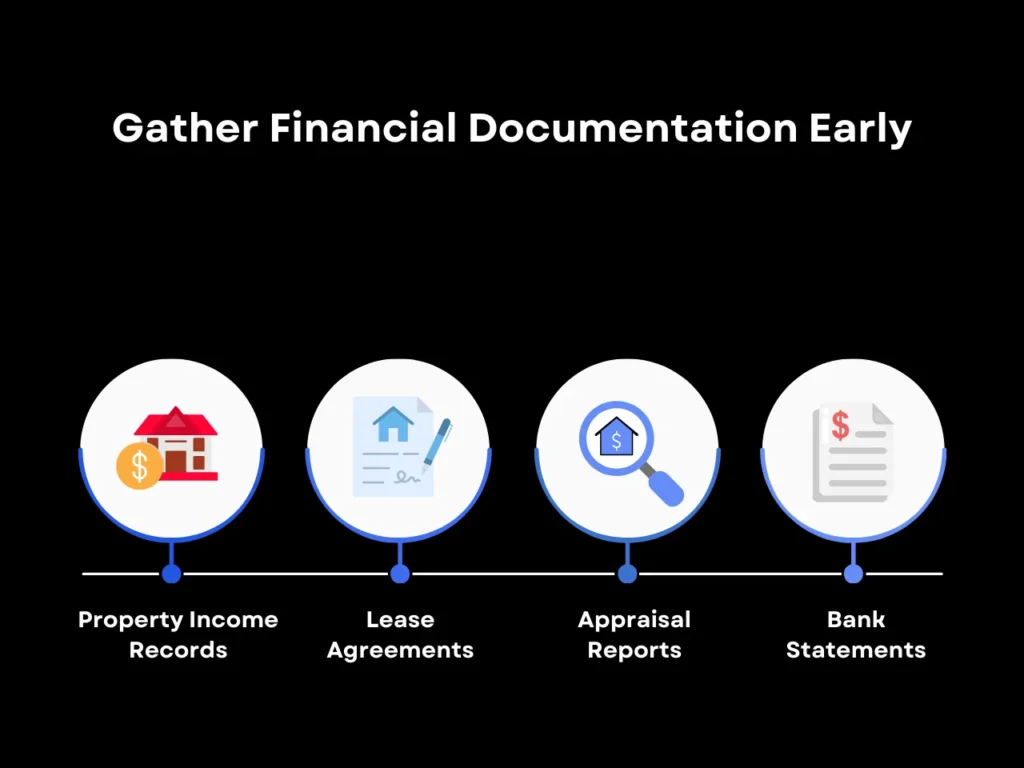
It’s important to gather the necessary property and personal financial documentation to ensure a smooth loan approval process. Missing documents can increase the time it takes for lenders to approve the loan.
If your application is missing any documents, lenders will pause their review to notify you, and you’ll then need to supply the missing information. Meanwhile, lenders are often juggling multiple clients and property appraisals, so reinserting your application into their schedule can result in delays.
To avoid this, compile all necessary documents before applying. These typically include:
- Property Income Records: Recent rent rolls or profit-and-loss statements provide a detailed overview of the property’s revenue performance. Lenders use this data to assess whether the property generates enough rental income to cover its debt obligations.
- Lease Agreements: For properties that have currently residing tenants, providing signed lease agreements confirms existing rental income and tenant stability. These documents assure lenders that the property will continue to produce steady income.
- Appraisal Reports: If you already have them available, documentation of a recent property appraisal gives lenders insight into the property’s market value and potential cash flow. This can be critical in determining the loan-to-value (LTV) ratio. Otherwise, the lender will likely order their own appraisal, which will be included in your closing costs.
- Bank Statements: Lenders typically require at least 3–6 months of personal or business bank statements to verify cash reserves. These statements highlight your ability to handle unexpected expenses or temporary income disruptions.
Some lenders may also ask for documentation of other personal assets to gauge your overall liquidity if you’re lacking in certain eligibility requirements. Being ready with all of these documents ensures a smoother, faster loan process. It reduces back-and-forth communication with the lender and minimizes the risk of delays caused by missing information.
3. Improve Your Credit Score
Although DSCR loan terms mainly depend on the property’s income potential, your credit score can still influence loan terms, as it’s the best indicator of how well you have met financial obligations in the past.
Here are some ways you can improve your score:
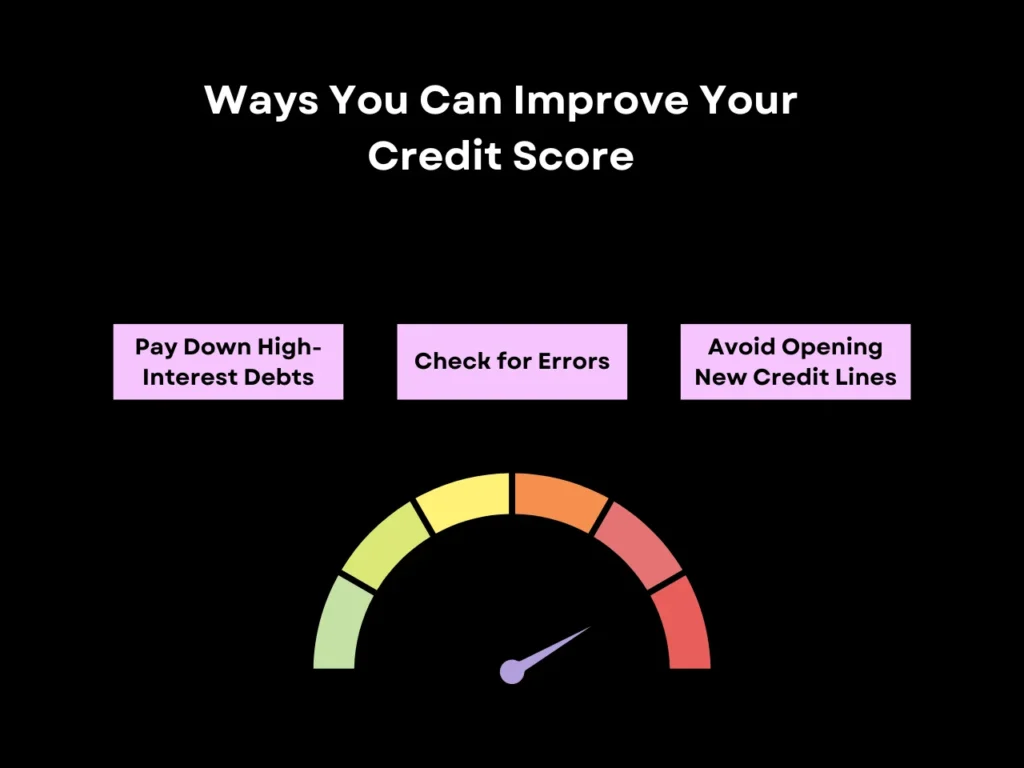
- Pay down high-interest debts: Reducing your credit utilization ratio can quickly boost your score.
- Check for errors: Review your credit report for inaccuracies that might be dragging down your score.
- Avoid opening new credit lines: Opening a new credit card or credit line can temporarily lower your score which is not ideal during the loan application process.
Remember, lenders typically look for a credit score of 650 or higher. At Defy, however, our minimum credit score requirement is 620. A higher credit score could secure better interest rates and lower fees, while a poor score may lead to higher costs or stricter terms.
4. Calculate Your DSCR Ratio Ahead of Time
Since the DSCR ratio is the main determiner of loan terms, it’s in your best interest to ensure that the DSCR of your selected property is as high as possible. Calculating your chosen property’s DSCR helps you evaluate whether the property is a good candidate for financing or whether you may want to search for a different property to get better terms.
Remember that the DSCR ratio is the net operating income or the yearly revenue a property generates after deducting operating expenses, divided by the total debt service, which is the yearly total of recurring fixed expenses tied to a property, such as mortgage payments, homeowner’s association dues, and property taxes.
This means that if a property generates $180,000 every year, but pays $60,000 in operating expenses such as maintenance and property management fees, then its net operating income is $120,000. If we suppose its monthly loan payments, taxes, and homeowner’s association fees add up to $100,000 per year, its DSCR ratio would be 1.2.
This means that the property generates 20% more income than its debt, which is the minimum many lenders prefer. However, higher DSCR ratios (e.g., 1.4 or above) can improve your chances of approval and help you secure better terms.
5. Prepare a Solid Business Plan (If Applicable)
For commercial properties, a detailed business plan can strengthen your DSCR loan application. A well-crafted plan shows lenders that you’ve thoroughly considered the property’s income potential and long-term viability. Some lenders also require borrowers to prepare a business plan to evaluate the feasibility of the investment and ensure it aligns with their lending criteria. Make sure your business plan includes these critical components:
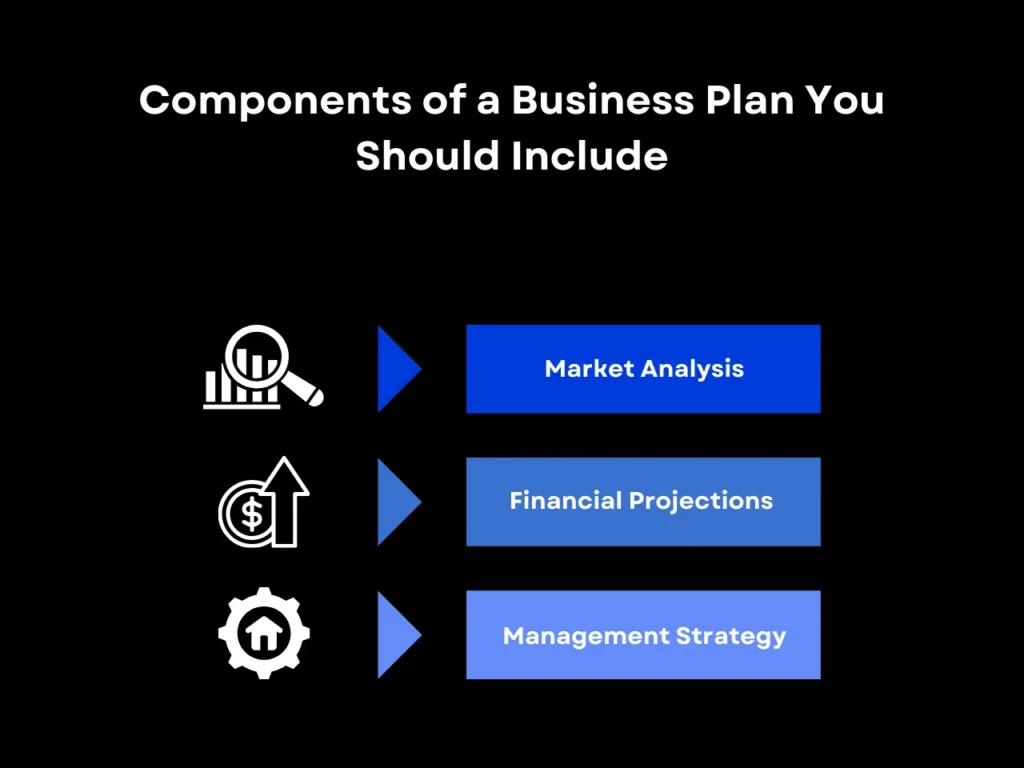
- Market analysis: Demonstrate understanding of the local market and demand trends.
- Financial projections: Show expected income, expenses, and profitability over time.
- Management strategy: Outline how you’ll manage and maintain the property effectively.
This level of preparation not only instills confidence in lenders but may also highlight areas where you can optimize your property’s performance.
6. Demonstrate Reliable Cash Flow
Another aspect of your personal finances that lenders might look at is your cash flow. Even though your personal income doesn’t have to meet a certain threshold for a DSCR lender to deem you creditworthy, lenders may gauge how well you’re managing your cash flow by looking at your spending habits.
Your cash reserves can also be assessed, particularly if you’re lacking in certain criteria. Having several months’ worth of mortgage payments in store provides assurance that you can meet debt obligations even through disruptions in the property’s income stream.
7. Choose the Right Lender
Not all lenders are well-versed in DSCR mortgage loans. Exploring lenders who provide financing for real estate investors is crucial. Those that specialize in non-QM loans like DSCR loan programs tend to offer the best results for investors. Lenders experienced in non-QM loans, which are loans that aren’t held to the same standards and requirements set by the CFPB, can be more comfortable with the risk involved and are thus more likely to offer you competitive rates. They’re also likely to be more skilled at handling applications, making for a smoother process.
Real estate financing serves as a strategic instrument that goes far beyond simply accessing funds. It empowers investors to execute their vision, create diverse investment portfolios, and generate lasting wealth through property investments. When structured thoughtfully, financing options help transform promising real estate opportunities into tangible financial success. This all starts with finding the right lender.
8. Understand the Loan Terms and Conditions
Private lenders often have specific terms and conditions that vary widely, so understanding these is critical. Common aspects to review include:
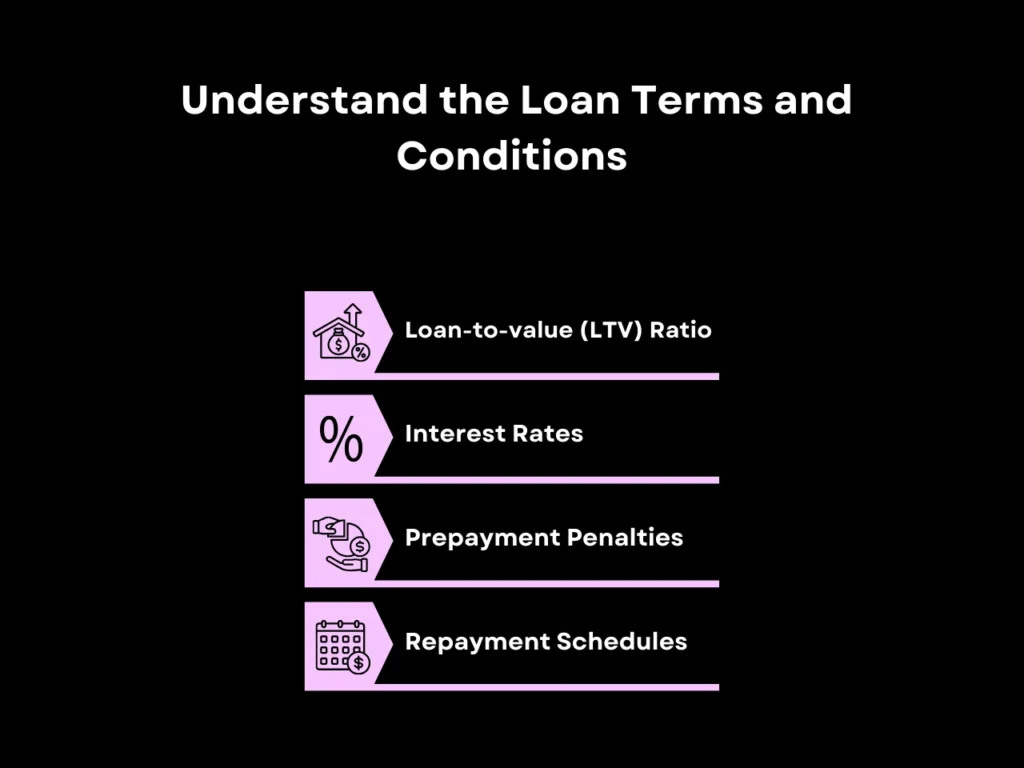
- Loan-to-value (LTV) ratio: The maximum loan amount relative to the property value. Lenders typically cap LTV at 75-80%.
- Interest rates: Fixed or variable rates can impact long-term costs.
- Prepayment penalties: Some lenders impose fees for paying off the loan early.
- Repayment schedules: Ensure the timeline aligns with your cash flow expectations.
Thoroughly reviewing these details ensures the loan aligns with your financial goals and investment strategy.
9. Consult a Financial Advisor or Mortgage Broker
Even if you have financial or real estate investment expertise of your own, it can still be worthwhile to seek professional guidance to identify things you may have missed. Consulting a local mortgage broker can give you in-depth insight into nuances of their area’s real estate market. This can inform your search for properties with the best income potential, highlighting untapped opportunities or cautioning you about disadvantages to seemingly perfect properties that may not be readily apparent. They can also parse your business plan and identify any gaps that may weaken your application.
Meanwhile, a financial advisor can advise you on your overall financial profile. They can help you optimize your financial profile to meet DSCR loan requirements, directing you to areas where you may need to improve, such as boosting your credit score, consolidating debt, or increasing cash reserves. A financial advisor can also help you balance the potential risks and rewards of taking on a DSCR loan, ensuring it aligns with your long-term investment goals.
10. Practice Patience and Persistence
Even with the best of efforts, you may still be faced with unideal loan terms or outright rejections of your application. The approval process can also take a few weeks before you find out the results of your application. This is why patience and persistence are both important virtues when real estate investing with a DSCR loan.
Lenders can often be preoccupied with their other engagements, so make sure to follow up regularly to get updated on the status of your application and whether there were any details you may have missed. If lenders aren’t giving you the loan terms you were hoping for, it may be worth going over your business plan again and searching for properties that have a higher DSCR. Having patience throughout this process and persisting through initial setbacks is important and will hopefully benefit you in the long run with a favorable DSCR loan that maximizes ROI.
Apply For DSCR Loans FAQ
What DSCR ratio do lenders typically require?
Most lenders prefer a DSCR ratio of 1.2 or higher, meaning the property generates 20% more income than its debt obligations. Some lenders may accept lower ratios for well-qualified borrowers, but higher ratios (e.g., 1.4 or above) often result in better loan terms. At Defy, we offer DSCR loans for properties with DSCRs as low as 0.75.
Can I get a DSCR loan with a low credit score?
Lenders typically look for a credit score of 650 or higher. At Defy, however, our minimum credit score requirement is 620. A higher score typically leads to more competitive terms, such as lower interest rates and reduced fees.
How does a DSCR loan differ from conventional loans?
Unlike traditional loans, which rely heavily on personal income and employment history, DSCR loans focus on the property’s income potential. This makes them particularly suitable for real estate investors, self-employed individuals, and those with non-traditional income sources.
Are DSCR loans only available for commercial properties?
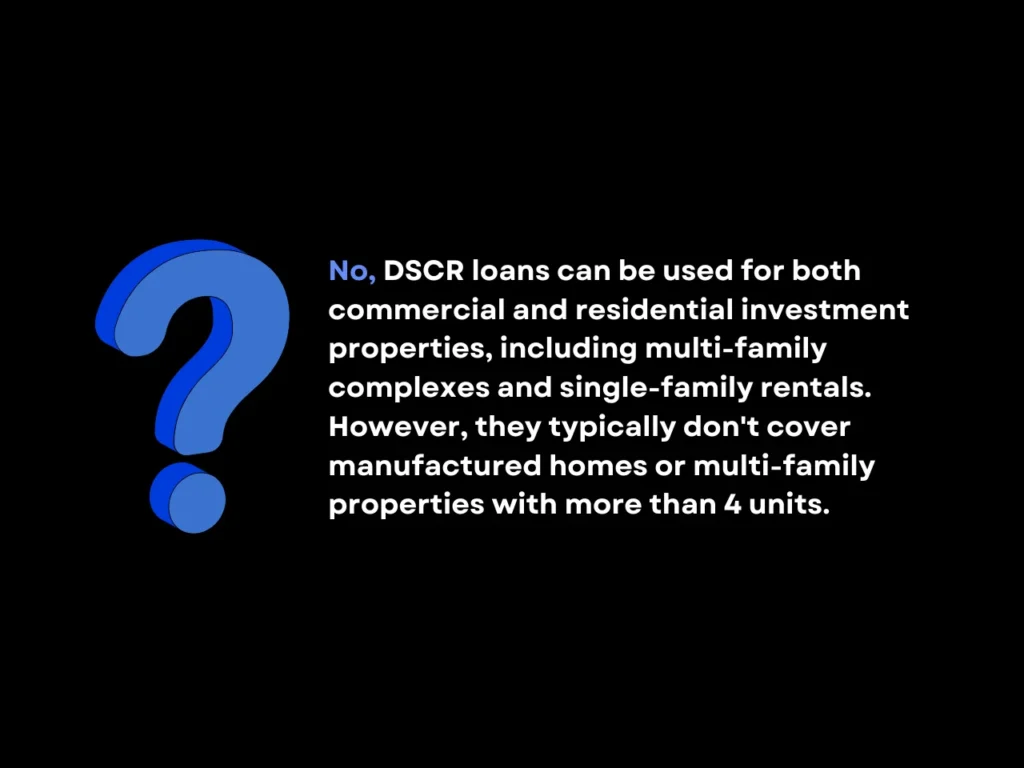
No, DSCR loans can be used for both commercial and residential investment properties. Whether you’re purchasing a multi-family complex or a single-family rental, these loans are tailored for income-generating properties. Properties that aren’t normally allowed by DSCR lenders include manufactured homes and multi-family homes with more than 4 units.
Can DSCR loans be used for property improvements or renovations?
Most DSCR financing requires rent-ready properties, meaning they cannot typically be used for major renovations or construction projects. If significant improvements are needed, investors often use hard money loans for construction or substantial repairs and later refinance into a DSCR loan for long-term financing. However, terms for renovation funding vary by lender, so it’s essential to clarify this during the application process.
Key Takeaway
Applying for DSCR loans doesn’t have to be daunting. By understanding the DSCR loan process and following these tips, you can vastly simplify the process and increase your chances of approval.
Before setting out to submit a DSCR loan application, remember to thoroughly assess the property’s income potential, ensure you meet all eligibility criteria, and gather all necessary documentation to streamline the process and improve your chances of approval.
Ready to get started with a DSCR loan that’s perfectly tailored to your investment goals? Reach out to Defy and let’s get the ball rolling. With our streamlined platform, fast pre-approvals, and dedicated support, we can ensure a seamless experience from start to finish.

About the Author: Meet Todd Orlando, co-founder and CEO of Defy Mortgage and Defy TPO. With over 20 years of experience in banking and financial services at institutions like First Republic and Morgan Stanley, Todd has dedicated his career to broadening access to lending and revolutionizing the mortgage industry, particularly in the non-QM space.
In 2022, Todd launched Defy Mortgage to provide real estate investors, entrepreneurs, and self-employed individuals with a secure, streamlined, and personalized lending experience tailored to meet their specific needs. He knows firsthand how access to the right mortgage can make or break a project and how today’s borrowers need flexible financial partners and creative lending options designed for their unique needs and lifestyles. Traditional banks are rigid, and their one-size-fits-all approach is outdated. That’s why he created Defy Mortgage — to stay ahead of the curve, set new standards in lending, and deliver personalized, non-traditional solutions for those looking to purchase or refinance.
For the third year running, Todd has been recognized by Inman News for excellence in the mortgage and lending industry, landing on their prestigious Best of Finance list for 2025. He was also honored as a mortgage finance leader in 2023 and 2024 for the same award. His visionary leadership has earned him endorsements from esteemed former colleagues at prestigious institutions across the financial services spectrum.
Beyond his work in finance, Todd is also a co-founder of two software companies in commercial lending and healthcare tech, an active real estate investor, and a husband and father of three. An industry disruptor, Todd is here to redefine what’s possible in mortgage lending.
Mortgage broker itching to elevate client offerings? Check out our TPO business, Defy TPO: https://defytpo.com/




